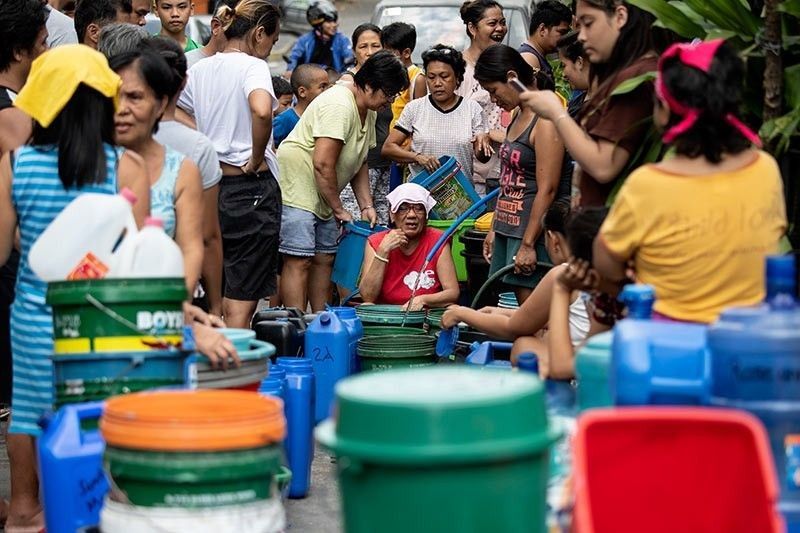Why pay for water, a free gift of nature?


Water is a free gift of God (or of Nature if you don’t believe in Him) so why should we pay for it? Will the time also come when we have to pay for the air we breathe?
We tested these questions years ago on an official of the Metropolitan Waterworks and Sewerage System before Metro Manila was split between private concessionaires Manila Water and Maynilad Water Services.
His answer: We don’t pay for the water, but for the cost of processing and bringing it to consumers. To simplify billing, we use as basis the volume of water delivered. But untreated or raw water is still free to those who can draw it themselves from springs, aquifers, and such natural sources. As for air, the oxygen and other elements extracted from it are sold to those needing them.
Aside from the cost of processing and distribution, the value-added items in the water business include taxes, operating expenses, foreign exchange differentials for loans, profits, dividends and other expenses that make costly this supposedly free gift of God.
May the exclusive concessionaires force anyone in their franchise areas to get (buy) water only from them? No. In this free market, there are some people who still purchase processed water in plastic containers and those who draw it from deep wells.
Not a few analysts have predicted that the next world war could be over water, the global supply of which is said to be dwindling and unevenly distributed or whose sources are being controlled by states favorably situated on the face of the globe.
Another kind of war erupts now and then in this country where greed motivates those whose wealth and influence have placed them in a vantage to exploit their fellows over something basic that God intended for everyone.
On Tuesday, President Duterte threatened to file charges of economic sabotage against the private concessionaires that he accused of milking captive consumers of billions over the years.
Duterte said the contracts of Manila Water and Maynilad Water Services Inc. are disadvantageous to the public because they prevent the government from adjusting water rates.
Speaking in Malacañang during the signing of two laws, Duterte said: “I will file economic sabotage and I will arrest them, all of them... I will let them experience how it’s like to go to jail. If they drag me, I will join them in prison. There’s no problem.”
Duterte said he has ordered Solicitor General Jose Calida and Finance Secretary Carlos Dominguez to draft a new concession contract that is favorable to the public and the government.
He was reacting to the order of a Singapore-based arbitration court for the Philippine government to pay P7.39 billion to Ayala-led Manila Water for the firm’s losses incurred with the rejection of its water rate increases since 2015.
Duterte claimed Manila Water won the case because the company is “part of the club,” without explaining what he meant. He added: “We cannot raise or lower the rates. They are the only ones who can do it.”
He also adverted to the concessionaires’ collecting sewerage fees without doing their obligation to connect sewage lines of their 14 million consumers to a sewerage system. Despite this failure, the firms have raised the specter of higher water rates.
The concessionaires have been raking in billions in profits, partly from the 20-percent environmental charge and 30-percent sewer charge that they have been collecting from customers without connecting them to a sewerage system.
The Supreme Court upheld in August a 2009 Department of Environment and Natural Resources order penalizing the two suppliers and the MWSS with P1.84 billion in combined fines for violating Section 8 of the Clean Water Act.
• Lessons offered by Argentine polls
A FILIPINO would be amazed by the display of magnanimity in victory and graciousness in defeat in the recent Argentine presidential elections that was a study in class and decency, something seldom seen in Philippine politics.
When the trend became clear hours after the polls closed showing the slightest of margins, conservative Mauricio Macri, the incumbent, immediately conceded to his center-left challenger Alberto Fernandez, who then accepted the concession big-heartedly.
Macri even invited Fernandez for a breakfast chat at the Pink Presidential Palace, vowing an orderly transition that shifts Latin America’s No. 3 economy back toward the left after it was battered by economic crisis.
Fernandez promised that he would collaborate, saying he would focus on “stopping the suffering of all Argentinians.”
The post-election congeniality and show of statesmanship were a departure from the great amount of muck raked, a lot of names called, and not a few skeletons dragged out of closets during the campaign.
Their election system may have helped ensure an early orderly turnover. The lightning-fast speed with which results were transmitted and published gave the elections credibility and helped create a climate where even mortal rivals can accept the results.
The Argentine election commission showed itself to be dead-serious in modernizing the country’s polls. Its technology provider is the same Smartmatic that has helped our Commission on Elections since 2010.
The Comelec used 92,509 vote counting machines in 2016 leased from Smartmatic. In 2019, around 97,000 VCMs were bought for P2.1 billion; over a quarter of the Comelec’s P8 billion budget for that time.
The vote counting in Argentina was way faster than that in the Philippines because its system is not a hodge-podge of suppliers. Points of failure/delay were minimized.
The Argentinian experience makes a sick joke the observation that in the Philippines, no politico loses an election but is only cheated.
* * *
NOTA BENE: All Postscripts can be accessed at manilamail.com. Follow author on Twitter as @FDPascual. Email feedback to [email protected]
- Latest
- Trending























